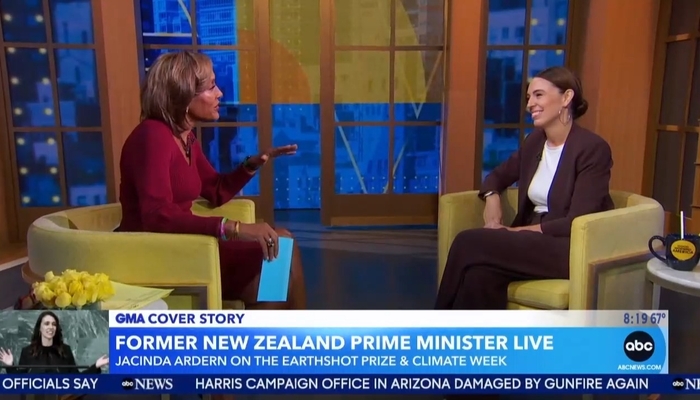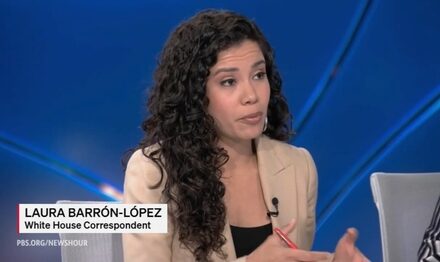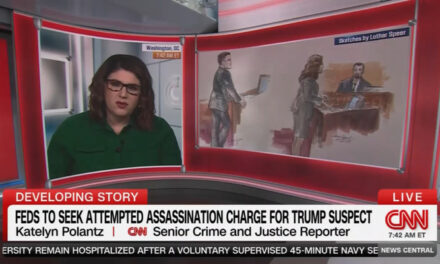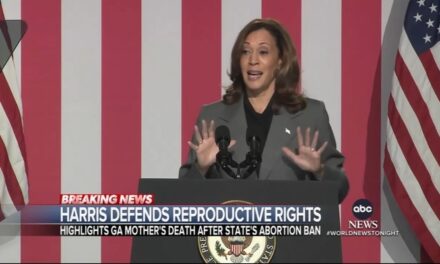We support our Publishers and Content Creators. You can view this story on their website by CLICKING HERE.

Not only is ABC News biased against conservatives and offer North Korean-levels of support for leftists in the United States, but they’re in the tank for other current and former world leaders as well. Wednesday’s Good Morning America illustrated that with co-host Robin Roberts showcasing her lack of journalistic chops by yet again fawning over former far-left New Zealand Prime Minister Jacinda Ardern for her new role working for Prince William on climate change.
Of course, left out of Roberts’s gooey segment was the fact that New Zealand voters were so ready for her Labour Party to be tossed out that right-of-center parties now hold 68 out of 123 seats in Parliament with Labour down at 34 and fellow lefties in the Greens at 14.
Alas, those pesky facts didn’t make it through and Roberts promoted Ardern as an popular icon, celebrating her role as “a trustee for Prince William’s global environmental Earth Shot Prize and a conservation international distinguished fellow.”
Roberts added “[i]t is so good — so good — to have you back here” and, after remarking she’s stayed in the U.S. awhile now (nearly a year), she lobbed the first softball: “You delivered a wonderful keynote address at the opening ceremony of the Climate Week and you said it was a rallying cry. That was the title of your speech, so what is your rallying cry?”
She gave Ardern a long run way to talk about climate change and insist the issue to addressing it involves — wait for it — money. Thus, the two boasted how important the Earth Shot Prizes are (click “expand”):
ARDERN: In part, my rallying cry is to decision makers as well. I think, for a long time, we’ve assumed climate change policy is somehow polarizing, but a UNDP survey just this year actually found that, in the United States, 66 percent of people wanted to see more press and, globally, 86 percent of people wanted to see countries working together on solutions. And so, I think, you know, we see that when it comes to climate change it really feels like the world is a dumpster fire but, actually, the people of the world are pointing to it and saying, put it out, put it out quickly, we want to see that action and there’s some real opportunities.
ROBERTS: Yeah and — and the numbers — cause the numbers that you’re showing about the percentage of people —
ARDERN: Yeah.
ROBERTS: — it really is encouraging.
ARDERN: It is.
ROBERTS: You also were at the Earth Shot Prize Innovation Summit. The finalists were named. So, talk about the work that the prize is really focused on.
ARDERN: It is both a prize but also a platform and movement. What Prince William wanted to create was solutions that we could scale up quickly to restore our planet, to clean our air, to clean our oceans, to act on climate change, and also waste. So, 2.5 thousand nominees —
ROBERTS: Wow.
ARDERN: — from over 70 countries narrowed down to 15. And, 0these are solutions that, if we had the investment coming into them — and that’s really what the platform does for these finalists — we could scale those solutions up quickly and make a real difference. It’s a way of sharing the optimism but also the urgency we need on the climate.
(….)
ARDERN: One million pounds per prize.
ROBERTS: Mmhmm.
ARDERN: At the same time, those finalists then move into a fellowship program with us in order to scale up the solutions. And you know, the solutions can be diverse.
With Roberts offering interjections of agreement (and to make herself seem knowledgeable), Ardern explained one such focus is Antarctica since “we know global warming is twice the rate of the rest of the world, an area the size of the EU we are seeking marine protections for,” so it’s necessary to bring countries together to “send a message to the rest of the world that countries can unite at a time when we need them to.”
Roberts eventually got a word in and it was nauseatingly lame:
I can hear it. Your passion is evident. But as former prime minister, of course I have to talk a little politics with you because you were at the Democratic National convention in August. And you said this could be — it feels like a historic moment. So, with the U.S. elections coming up, how does that reflect on global politics right now?
Translation? Isn’t Kamala Harris great and, hopefully, she wins in November.
Still a politician, Ardern gave a warm, mealy-mouthed answer dripping with progressivism about “empathetic leadership” and decrying “polarization” in favor of a less “combative approach” to our discourse (click “expand”):
ARDERN: Do you know, I hear a lot of discussion here in the U.S. and I feel privileged to be an observer of this time —
ROBERTS: Mmmm.
ARDERN: — in history around polarization in the world of politics. This is an observation I see globally. It’s one of the reasons I didn’t expect to do this after I left office. I started a fellowship on empathetic leadership because I do think the public is seeking a more human centric approach to policies and decision-making. And so, now, I’m working with leaders to instill in politics to support them, to bring kindness back into the way we do politics because I do think people are seeking that.
ROBERTS: It’s kind of like what you are talking about with climate change and the global and just really being unified all of us, whether it’s politics, talking about climate change or — or anything like that?
ARDERN: I think something about our system at the moment rewards a combative approach, but I don’t think that’s what the public has voted for.
With time winding down, Roberts invoked Ardern finally marrying her “long-time partner”, but Ardern said it hasn’t felt different since she’s been busy, including “writing a book which has taken me away from home a bit more than I would like.”
Roberts noted she brought it up last time she was on the show (on September 20, 2023) and invited her to give views a sneak peek on what it’ll cover: “It’s a story of what it feels like to be a leader. So, it’s pretty personal, but I felt like there was no other way to tell a story of leadership than to — to share how it feels.”
Roberts came off enthralled with that word salad and made a vague allusion to Ardern’s massive gun confiscation while ignoring how New Zealanders have rejected her ideology: “I know and people were just so — your — the grace in how you handled the situation in New Zealand and your decisions that you made and being here in the U.S. and the work that you’re doing now to bring about change. Really appreciate it.”
To see the relevant ABC transcript from September 25, click here.

 Conservative
Conservative  Search
Search Trending
Trending Current News
Current News 





